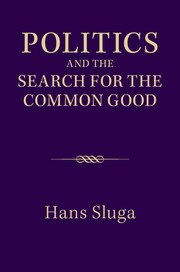Book contents
- Frontmatter
- Contents
- List of figures and tables
- Acknowledgments
- Introduction
- Part I The Search for the Common Good: Beyond the Normative and the Natural
- Chapter 1 From normative theory to diagnostic practice
- Chapter 2 The failings of political naturalism
- Chapter 3 The historization of politics
- Chapter 4 “The time is coming when we will have to relearn about politics”
- Part II Three Diagnostic Thinkers in Pursuit of the Common Good
- Part III The Fragility of the Common Good
- Bibliography
- Index
Chapter 2 - The failings of political naturalism
Published online by Cambridge University Press: 05 November 2014
- Frontmatter
- Contents
- List of figures and tables
- Acknowledgments
- Introduction
- Part I The Search for the Common Good: Beyond the Normative and the Natural
- Chapter 1 From normative theory to diagnostic practice
- Chapter 2 The failings of political naturalism
- Chapter 3 The historization of politics
- Chapter 4 “The time is coming when we will have to relearn about politics”
- Part II Three Diagnostic Thinkers in Pursuit of the Common Good
- Part III The Fragility of the Common Good
- Bibliography
- Index
Summary
We are thoroughly artificial creatures: shaped by historical circumstances that have assigned us the place we live in, the language we speak, the convictions we have, what we know and how we feel. We have learned to remake our bodies, our minds, and, indeed, our lives through training, education, technology, and science. We keep ourselves alive with the help of manufactured drugs, medical devices, and interventions. We live on highly processed foods, cover our bodies with man-made materials cut according to local custom, fashion, and whim, live in cocoons surrounded by gadgetry, and lock our front doors to shield out the surrounding world. We move on land, in water, and in the air inside metal containers whose movements we control with specialized technical skills. We communicate through invented symbols with the help of mechanical and electronic devices. We live attached to computers, operate machines, process documents, buy and sell goods with the help of a man-made system of exchange. And in the face of all this we still like to think of our condition as “natural” and thoroughly abhor the “unnatural.”
It is true, of course, that in addition to the artifice around and within us we are living beings with organic strengths and weaknesses, with bodily capacities and limitations, with physiological needs and desires. Birth and death, growing up and growing old give shape to our personal, social, and political existence. In politics, for instance, the natural cycle of birth and death necessitates a constant transfer of power and generates thus the peculiar instability of all our arrangements. Political regimes are characterized by the way they handle such transfers. Hereditary monarchy and electoral systems of government have developed elaborate mechanisms for it whereas messianic and dictatorial regimes often fail over this issue. The handicaps of the young and the old, health and disease, and other biological advantages and disadvantages make it impossible also to maintain a system of genuinely universal suffrage. The result is a diversification of power in every conceivable political system. Physiological needs and desires and the emotions they provoke in us (enthusiasm and terror, hope and despair) are motors of social and political activism.
- Type
- Chapter
- Information
- Politics and the Search for the Common Good , pp. 41 - 66Publisher: Cambridge University PressPrint publication year: 2014



